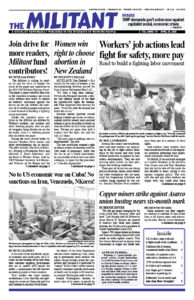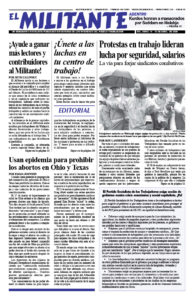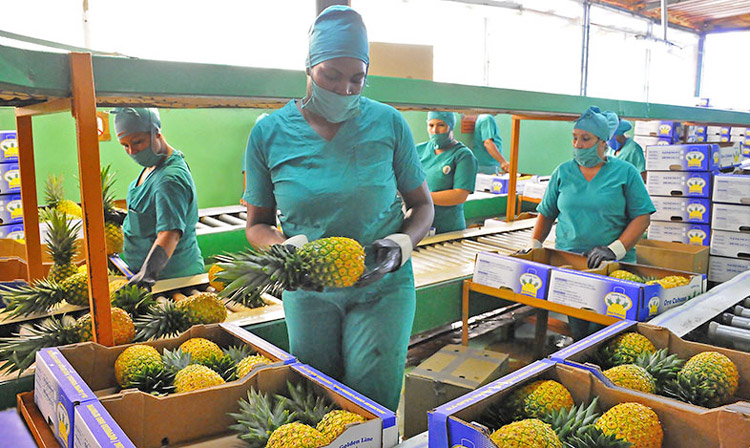In the midst of the worldwide capitalist economic and social crisis, the U.S. rulers are not backing off an inch from their sanctions targeting governments they are in conflict with around the world — punishments that fall heaviest on working people in those countries.
Their number one target remains revolutionary Cuba. And they are tightening the screws on Venezuela and Iran and continue to sanction North Korea.
On March 24 the State Department sent out a tweet slandering Cuba, claiming its government sends medical volunteers abroad to help combat the coronavirus only because it is motivated by “money.” In fact Cuba’s selfless internationalist volunteers provide much-needed health care to people in 60 countries, an example Washington seeks to bury.
Despite Washington’s decision to waive some of its moves to punish the Iranian people, because of the virus pandemic, its “maximum pressure campaign” includes a new round of sanctions that have limited Tehran’s ability to purchase needed equipment and medicines.
Sharp anti-Venezuela measures
Escalating its campaign to overthrow the government of Venezuela, the Justice Department March 26 unsealed indictments of Venezuelan President Nicolás Maduro and other government officials, claiming a conspiracy to ship massive amounts of cocaine to the U.S. And the State Department announced a $15 million reward for information leading to the capture or conviction of Maduro.
Violating Venezuela’s sovereignty, Washington called March 31 for a “transitional” government picked by the National Assembly that is dominated by pro-imperialist opposition parties. It would exclude Maduro and U.S.-backed Juan Guaidó, who claims he is Venezuela’s president and has been trying for over a year to foment a military coup to overthrow Maduro, but could include some members of Maduro’s party, the White House says.
Washington hates the friendly relations and collaboration between the governments and people of Cuba and Venezuela. Thousands of Cuban internationalist volunteers, including doctors, nurses and teachers, have brought health care and culture to the most isolated regions of Venezuela. And Venezuela has been a key source of low-cost oil for Cuba, which has been standing up to a U.S. economic war for more than 60 years.
With major shortages of medical supplies — and many clinics running without water and soap — the Maduro government requested a $5 billion emergency loan from the International Monetary Fund. The IMF turned the request down on the pretext that there is a dispute over who is the country’s president.
Stepped-up squeeze on Cuba
Over the last year the U.S. government has restored some restrictions on travel to Cuba, stepped up pressure on foreign banks to not handle Cuban financial transactions and sanctioned companies that ship Venezuelan oil to Cuba.
The drop in trade since the start of the pandemic and Washington’s economic war add up to greater hardships in Cuba, José Ramón Machado Ventura, second secretary of the Communist Party of Cuba, explained at three regional meetings held on the island March 28-29. Before the pandemic Cuba had already begun taking measures, including using oxen instead of tractors on many farms. Now there is even less fuel for tractors, less fertilizer and pesticides, and fewer food imports.
The meetings laid out the need for farmers and workers to increase agricultural production. Not through “slogans,” Machado said, but by learning from the farmers who have been most successful in increasing yields, careful planning and convincing more workers to shift to farm work.
A coalition of 11 groups in Miami, including the Alianza Martiana, issued a statement March 27 calling on Washington to end its sanctions against Cuba and Venezuela.
“Now is the time to end the U.S. blockade of Cuba,” said the National Network on Cuba, in a March 28 statement.
The U.S. rulers “try to get us to think that ‘we’re all in this together,’” Socialist Workers Party candidate for U.S. president Alyson Kennedy told the Militant March 30. “But their actions prove the opposite. Everything they do is to defend their system and their profits.
“Like revolutionary Cuba, we start with solidarity with working people around the world,” Kennedy said. “We demand an immediate and permanent end to the U.S. embargo of Cuba, and an end to the sanctions on Venezuela, Iran and North Korea. ”


